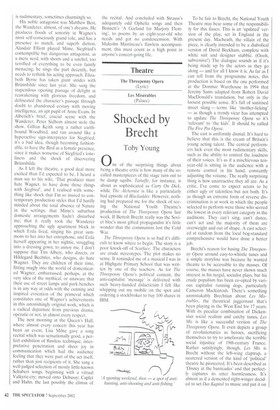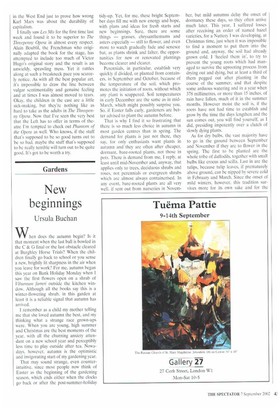Shocked by Brecht
Toby Young
0 ne of the surprising things about being a theatre critic is how many of the socalled masterpieces of the stage turn out to be damp squibs. Tartuffe, for instance, is about as sophisticated as Carry On Dick, while The Alchemist is like a particularly bad episode of Blackadder. However, nothing had prepared me for the shock of seeing the National Youth Theatre's production of The Threepenny Opera last week. If Bertolt Brecht really was the Soviet bloc's most gifted propagandist it's little wonder that the communists lost the Cold War.
The Threepenny Opera is so bad it's difficult to know where to begin. The story is a poor knock-off of Sea?face. The characters are crude stereotypes. The plot makes no sense. It reminded me of a musical I was in at Highgate Primary School that was written by one of the teachers. As for The Threepenny Opera's political content, the anti-capitalist 'message' is delivered with such heavy-handed didacticism I felt like whipping out my mobile on the spot and ordering a stockbroker to buy 100 shares in IBM. To be fair to Brecht, the National Youth Theatre may bear some of the responsibility for this fiasco. This is an 'updated' version of the play, set in England in the present day. Macheath, the villain of the piece, is clearly intended to be a diabolical version of David Beckham, complete with white suit and designer stubble. (Oooh, subversive!) The dialogue sounds as if it's being made up by the actors as they go along — and for all I know it is. As far as I can tell from the programme notes, this production is based on the one performed at the Donmar Warehouse in 1994 that Jeremy Sams adapted from Robert David MacDonald's translation, but only in the loosest possible sense. It's full of sanitised street slang — terms like 'mother-licking' — as though a trendy vicar has attempted to update The Threepenny Opera so it's 'relevant' to 'the kids'. It should be called The Five Pee Opera.
The cast is uniformly dismal. It's hard to believe that this is the cream of Britain's young acting talent. The central performers lack even the most rudimentary skills, such as the ability to control the loudness of their voices. It's as if a mischievous tenyear-old is sitting in the audience with a remote control in his hand, constantly adjusting the volume. The really surprising thing is how unattractive they all are. As a critic. I've come to expect actors to be either ugly or talentless but not both, It's as though an extreme form of reverse discrimination is at work in which the people selected to perform were those who scored the lowest in every relevant category in the auditions. They can't sing, can't dance, can't act and the majority of them are overweight and out of shape. A cast selected at random from the local bog-standard comprehensive would have done a better job.
Brecht's reason for basing The Threepenny Opera around easy-to-whistle tunes and a simple storyline was because he wanted theatre to be accessible to the masses. Of course, the masses have never shown much interest in his turgid, socialist plays, but his crude populism has been co-opted by various capitalist running dogs, particularly Cameron Mackintosh. There's something unmistakably Brechtian about Les Miserables, the theatrical juggernaut that's been playing in the West End for 17 years. With its peculiar combination of Dickensian social realism and catchy tunes, Les Mis is like a successful version of The Threepenny Opera. It even depicts a group of revolutionaries as heroes, sacrificing themselves to try to ameliorate the terrible social injustice of 19th-century France. Rather satisfyingly. though, Les Mis is Brecht without the left-wing claptrap, a neutered version of the kind of 'political' theatre he pioneered. It's been described as 'Disney at the barricades' and that perfectly captures its utter harmlessness. It's almost as if a demented right-winger decided to set Das Kapital to music and put it on in the West End just to prove how wrong Karl Marx was about the durability of capitalism.
I finally saw Les Mis for the first time last week and found it to be superior to The Threepenny Opera in almost every respect. Alain Boublil, the Frenchman who originally adapted the book for the stage, has attempted to include too much of Victor Hugo's original story and the result is an unwieldy, sprawling mess. Yet it rattles along at such a breakneck pace you scarcely notice. As with all the best popular art, it's impossible to draw the line between vulgar sentimentality and genuine feeling and at times I was almost moved to tears. Okay, the children in the cast are a little sick-making, but they're nothing like as hard to take as the adults in The Threepenny Opera. Now that I've seen the very best that the Left has to offer in terms of theatre I'm tempted to check out Phantom of the Opera as well. Who knows, if the stuff that's supposed to he so good turns out to be so bad, maybe the stuff that's supposed to be really terrible will turn out to be quite good. It's got to be worth a try.



























































 Previous page
Previous page